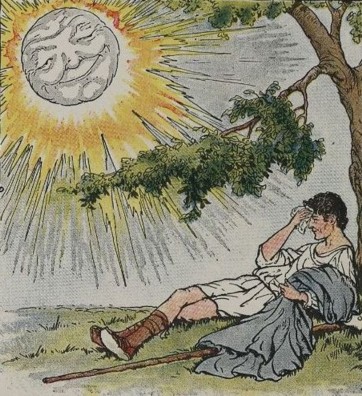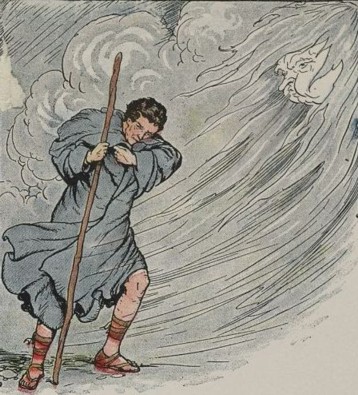| 1. quarrel | /KWAWR-uhl/ |
| -an angry disagreement between two or more people or groups | |
| Peter had a quarrel with his older brother earlier this morning. | |
| 2. dispute | /dih-SPYOOT/ |
| -to disagree with something that someone says | |
| The store manager disputed what the customer said. | |
| 3. strip | /strip/ |
| -to remove, pull, or tear the covering or outer layer from something | |
| We decided to strip the wallpaper off the walls. | |
| 4. gust | /guhst/ |
| -a sudden strong wind | |
| A gust of wind blew their hats off. | |
| 5. blazing | /BLEY-zing/ |
| -very bright and hot; powerful and impressive | |
| The laborers continued their work under the blazing sun. |


“Let us agree”, said the Sun, “that he is the stronger who can strip that Traveler of his cloak.”
“Very well”, growled the North Wind, and at once sent a cold, howling blast against the Traveler.
With the first gust of wind the ends of the cloak whipped about the Traveler’s body. But he immediately wrapped it closely around him, and the harder the Wind blew, the tighter he held it to him. The North Wind tore angrily at the cloak, but all his efforts were in vain.
Then the Sun began to shine. At first his beams were gentle, and in the pleasant warmth after the bitter cold of the North Wind, the Traveler unfastened his cloak and let it hang loosely from his shoulders. The Sun’s rays grew warmer and warmer. The man took off his cap and mopped his brow. At last he became so heated that he pulled off his cloak, and, to escape the blazing sunshine, threw himself down in the welcome shade of a tree by the roadside.
Gentleness and kind persuasion win where force and bluster fail.
| 1. | What happened while the North Wind and the Sun were quarelling? |
| 2. | How did the North Wind and the Sun determine who was stronger between the two of them? |
| 3. | Who won between the two? |
| 1. | Describe the Sun and North Wind’s personalities. |
| 2. | Why do you think there was a competition between the Sun and the North Wind? |
| 3. | Do you think that the challenge involving the traveler was a good idea? Why or why not? |
| 4. | Do you agree that gentle persuasion is better than aggressiveness? Explain your answer. |
| 5. | In what real-life situation/s can we apply the fable’s moral? |
| Grammar 文法 |
Pronunciation 発音 | Vocabulary 単語 |
Comprehension 理解 |
|
|---|---|---|---|---|
 GOOD GOOD |
文法の誤りはほとんどなく、完全な文章で話すことができる | ほとんどの単語をはっきりと正しく発音することができる | 習った表現を適切に使うことができる | 文章を理解し、質問に正しく答えることができる |
 FAIR |
文法の誤りはあるが、完全な文章で話すことができる | 発音の練習が必要な言葉がいくつかある | たまにミスはあるが、習った表現を適切に使うことができる | 文章を完全に理解するのは難しく、質問に正しく答えられないときもある |
 POOR |
文章で話すのは難しく、単語だけで話すことができる | 発音の練習が必要である | 習った単語と表現を少しだけ使うことができる | 文章を理解するのは難しく、質問に答えるのは難しい |
An eBook from The Project Gutenberg.
This eBook is for the use of anyone anywhere at no cost and with almost no restrictions whatsoever. You may copy it, give it away or re-use it under the terms of the Project Gutenberg License included with this eBook or online at www.gutenberg.org